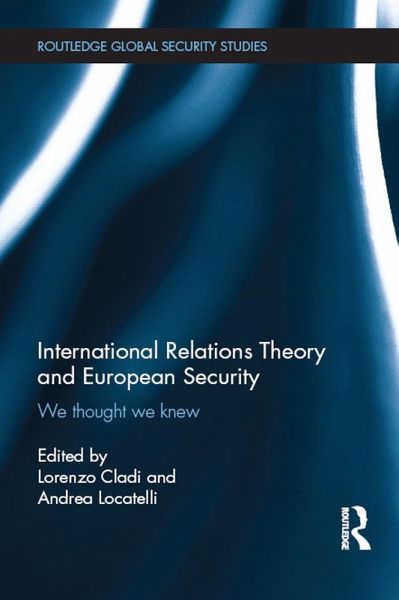
International Relations Theory and European Security (eBook, ePUB)
We Thought We Knew
Redaktion: Cladi, Lorenzo; Locatelli, Andrea
Versandkostenfrei!
Sofort per Download lieferbar
51,95 €
inkl. MwSt.
Weitere Ausgaben:

PAYBACK Punkte
26 °P sammeln!
This book engages with key contemporary European security issues from a variety of different theoretical standpoints, in an attempt to uncover the drivers of foreign policy and defence integration in the EU.Although European foreign policy has been attracting an ever-increasing number of International Relations (IR) scholars since the end of the Cold War, consensus on what drives European foreign policy integration has not yet emerged. This book seeks to encourage debate on this issue by examining a wide range of high-profile security issues which have roused significant interest from policy m...
This book engages with key contemporary European security issues from a variety of different theoretical standpoints, in an attempt to uncover the drivers of foreign policy and defence integration in the EU.
Although European foreign policy has been attracting an ever-increasing number of International Relations (IR) scholars since the end of the Cold War, consensus on what drives European foreign policy integration has not yet emerged. This book seeks to encourage debate on this issue by examining a wide range of high-profile security issues which have roused significant interest from policy makers, academics and the public in recent years. The volume discusses, amongst other issues, the strategic posture of the European Union as a security actor, the troubled relationship with Russia, the debate regarding France's relations with the US following France's rapprochement with NATO and the EU's influence in the Israeli-Palestinian conflict. The collective intent of the contributors to highlight the drivers of EU foreign policy and defence integration ties together the wide variety of topics covered in this volume, forming it into a comprehensive overview of this issue. By paying considerable attention not just to the internal drivers of EU cooperation, but also to the critical role played by the US as an incentive or obstacle to European security, this book presents a unique contribution to this field of debate.
This book will be of much interest to students of European security, IR theory, Transatlantic Relations, European politics and EU foreign policy.
Although European foreign policy has been attracting an ever-increasing number of International Relations (IR) scholars since the end of the Cold War, consensus on what drives European foreign policy integration has not yet emerged. This book seeks to encourage debate on this issue by examining a wide range of high-profile security issues which have roused significant interest from policy makers, academics and the public in recent years. The volume discusses, amongst other issues, the strategic posture of the European Union as a security actor, the troubled relationship with Russia, the debate regarding France's relations with the US following France's rapprochement with NATO and the EU's influence in the Israeli-Palestinian conflict. The collective intent of the contributors to highlight the drivers of EU foreign policy and defence integration ties together the wide variety of topics covered in this volume, forming it into a comprehensive overview of this issue. By paying considerable attention not just to the internal drivers of EU cooperation, but also to the critical role played by the US as an incentive or obstacle to European security, this book presents a unique contribution to this field of debate.
This book will be of much interest to students of European security, IR theory, Transatlantic Relations, European politics and EU foreign policy.
Dieser Download kann aus rechtlichen Gründen nur mit Rechnungsadresse in A, B, BG, CY, CZ, D, DK, EW, E, FIN, F, GR, HR, H, IRL, I, LT, L, LR, M, NL, PL, P, R, S, SLO, SK ausgeliefert werden.













